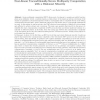Free Online Productivity Tools
i2Speak
i2Symbol
i2OCR
iTex2Img
iWeb2Print
iWeb2Shot
i2Type
iPdf2Split
iPdf2Merge
i2Bopomofo
i2Arabic
i2Style
i2Image
i2PDF
iLatex2Rtf
Sci2ools
146
click to vote
IACR
2011
2011
Near-Linear Unconditionally-Secure Multiparty Computation with a Dishonest Minority
Secure multiparty computation (MPC) allows a set of n players to compute any public function, given as an arithmetic circuit, on private inputs, so that privacy of the inputs as well as correctness of the output are guaranteed. Of special importance both in cryptography and in complexity theory is the setting of information-theoretic MPC, where (dishonest) players are unbounded, and no cryptographic assumptions are used. In this setting, it was known since the 1980’s that an honest majority of players is both necessary and sufficient to achieve privacy and correctness. The main open question that was left in this area is to establish the exact communication complexity of MPC protocols that can tolerate malicious behavior of a minority of dishonest players. In all works, there was a large gap between the communication complexity of the best known protocols in the malicious setting and the “honest-but-curious” setting, where players do not deviate from the protocol. In this paper, ...
| Added | 23 Dec 2011 |
| Updated | 23 Dec 2011 |
| Type | Journal |
| Year | 2011 |
| Where | IACR |
| Authors | Eli Ben-Sasson, Serge Fehr, Rafail Ostrovsky |
Comments (0)

